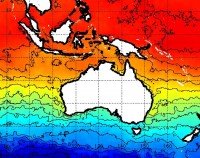Time and tide: how the Moon and other factors affect our oceans
15/08/2019

We all know that tides are influenced by the Moon, but how does that connection work and how can we predict the tides more than a year in advance?
They are just two of many questions the Bureau of Meteorology is answering this National Science Week (10-18 August), with the theme: Destination Moon: more missions, more science.
The Bureau provides the tide forecasts which are an essential tool for everyone from recreational fishers to the operators of giant container ships.
And while we rely on weather forecasts for up to a week in advance, many take for granted that tide tables can be relied on for well over a year.
Bureau of Meteorology Ocean Analyst Jessica Sweeney says the tide in any place is affected by the moon and several other factors.
"Gravitational forces of the earth, moon and sun drives the tide, but few people know that the combination of these forces sloshes the deep ocean water back and forth. The resulting long waves then move around the globe and interact with the continental land masses. Calculating these effects at the coast is complex," she said.
Just to make the job more complicated, the Moon's effect on sea levels can vary from one location to another.
"The shape of the coastline and depth of bays along with the positions of the moon, sun and planets are all factors that make the tidal range and frequency vary at different places around the world.
"On top of this, weather (both nearby and remote) and ocean circulation dynamics also affect the total sea level along coastlines. Where the tidal range is small, sometimes it is these other factors that have the bigger effect," she said.
Dredging Manager Frans Schlack from Pilbara Ports Authority says knowing what the sea level will be, ahead of time, influences multi-million-dollar decisions every day.
"If it wasn't for accurate tide predictions, we couldn't operate safely and efficiently at the Port of Port Hedland, the world's largest bulk export port." he said.
So, when you look up at the night sky this Science Week just remember, the Moon may be more powerful than you thought.










